Ask a question from expert
Environmental Impact of Shell’s Oil and Gas on Land : Case Study of Niger-Delta
42 Pages12754 Words100 Views
Added on 2020-07-22
Environmental Impact of Shell’s Oil and Gas on Land : Case Study of Niger-Delta
Added on 2020-07-22
BookmarkShareRelated Documents
Analysis of the Environmental Impact ofShell’s Oil and Gas Upstream Activities onLand: A case study of Niger-Delta
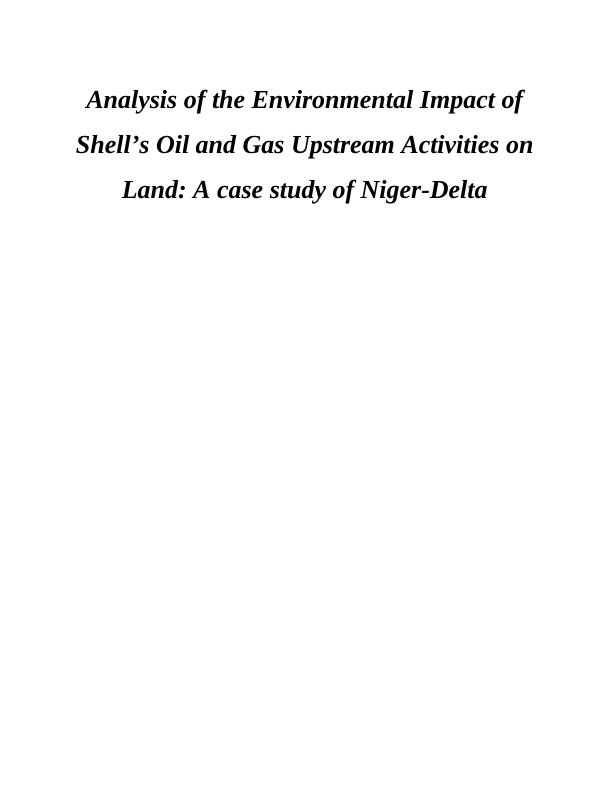
TABLE OF CONTENTSCHAPTER 1 - INTRODUCTION...................................................................................................11.1 Overview of research.............................................................................................................11.2 Rationale of Study.................................................................................................................21.3 Research aim and objectives..................................................................................................31.4 Research questions.................................................................................................................31.5 Framework and analysis........................................................................................................4CHAPTER 2 - LITERATURE REVIEW........................................................................................62.1 Introduction............................................................................................................................62.2 Various ways pollution is being caused by oil and gas production.......................................62.3 Identification of stakeholders who are impacted by the activities of oil companies.............72.4 The impact of Shells oil and gas upstream activities on the environment and land..............82.5 Expansion of oil extraction activities is troubling the local communities and traditionalbusiness of people......................................................................................................................11CHAPTER 3 - RESEARCH METHODOLOGY..........................................................................143.1 Overview..............................................................................................................................143.2 Research design...................................................................................................................143.3 Research approach...............................................................................................................153.4 Research philosophy............................................................................................................153.5 Data collection technique....................................................................................................163.6 Sampling technique.............................................................................................................163.7 Research Limitation.............................................................................................................173.8 Ethical consideration...........................................................................................................173.9 Validity and reliability.........................................................................................................183.10 Data analysis......................................................................................................................19CHAPTER 4 - DATA ANALYSIS...............................................................................................204.1 Overview..............................................................................................................................204.2 Thematic analysis................................................................................................................20CHAPTER 5 - RECOMMENDATIONS AND CONCLUSION..................................................325.1 Recommendations................................................................................................................325.2 Conclusion...........................................................................................................................33
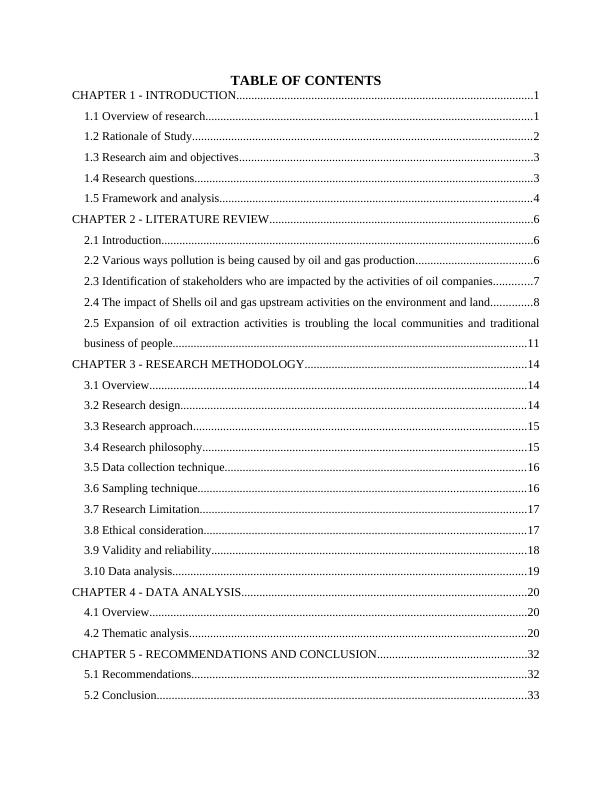

CHAPTER 1 - INTRODUCTION1.1 Overview of researchAfrica has become a beacon to the world when it comes to oil and gas production. It is wellknown that it is a continent that has more than 30% resources under its bedrock which makes it ahighly attractive location for major oil companies. It accounts for more than 13% of globalproduction of oil. This is the level of contribution of a continent as whole which is considered tobe in exploratory phase. By the end of 2015, European Union was one of the biggest importersamounting to 400 million barrels worth more than 73 billion Euros. There are more than 500companies that are operating in Africa upstream oil and gas industry (Inkpen and Moffett, 2011).There has been surge in the number of companies from Asia as they are the ones that has hugeenergy requirements. The biggest oil company like Shell is one of the leaders in growing marketof Africa. It has one of the largest bases in the continent. All the activities that are conducted bythese organisations have a great impact on the environment which reduces quality of atmosphereand gives birth to diseases and destruction. Background of Study: Environment is a crucial aspect for any industry to maintain. if a firm is found to beexploiting the resources present in nature then they have to stop. The expansion of operation byoil and gas companies has caused maximum level of destruction of nature and availableresources. It is the people and long term side effects that threaten society as well as stability incontinent. Oil spills and other issues have a direct impact upon the environment and humanhealth as well as it threatens traditional business of people in continent (Papavinasam, 2013). InNiger, the worst case scenario for day can lead to loss of more than 722 barrels’ loss of oil ondaily basis. At minimum, there is 93 barrels’ loss of oil per day which is also a lot as these spillshave impact upon the land as well as surroundings. The prime issues which is a cause of concernis compensation that is given by these organisations to the communities that are impacted by thespills. In case of Niger, MNC companies like shell transfers money to government which thenprovide that financial compensation to communities but it does not reach them as perrequirements. Another major concern is gas flaring which is one of the most common practices which isconducted in Africa by oil and gas organisations. This is mostly happening in Niger Delta whichis causing addition to the increase in greenhouse gases. It has higher level of impact upon the1
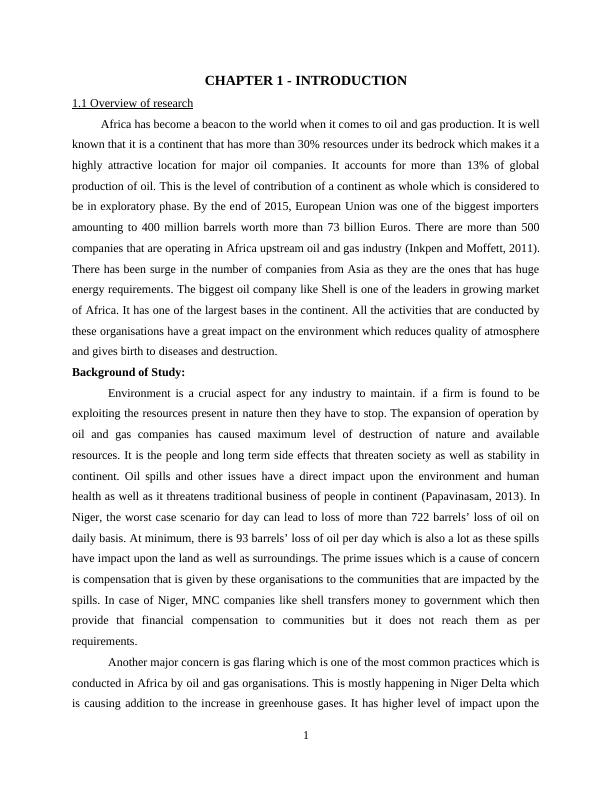
health of people and damages livelihood of local communities. The issues is that all this flaringhappens in on shore of Niger Delta ranging from 19% to 75% while globally this average is ataround 4.8%. Due to this, number of reporting regarding diseases have increased in localcommunities that are living near Niger Delta (Ite and et. al., 2013). Some of the issues whichwere reported are cancer, gastrointestinal, respiratory ailments, etc. Background of Organisation:Royal Dutch Shell Is a British-Dutch oil and gas company that has operations in multiplecountries. It has its headquarters in Netherlands while it was incorporated in the UnitedKingdom. It is in the top six of being super big oil and gas organisation and was 5th as per itsrevenue in 2016. It is a vertically integrated organisation that participates in exploration,production, refining, marketing and distribution, power generation, trading and petrochemicals.The company is also known to involve itself in renewable energy field where it works inbiofuels, wind and hydrogen. Shell has an operational capability in approx. 70 countries where it produces more than3.7 million barrels of oil every single day. Also, it is known to have more than 44000 servicestations across these countries. The organisation has proved reserves of more than 13.7 billionbarrels of oil. Shell has many subsidiaries around the globe and they are all major companies inthe field of oil and gas. It has 93000 employees working at different shifts in various countries. Itis the biggest organisation that is listed on London Stock Exchange, while for its secondarylisting, it is cited on Euronext Amsterdam as well as New York Stock Exchange. There are twomajor shareholders in company which are Capital Research Global Investors and BlackRockwho owns 9.85% and 6.89% of shares respectively. Shell is one of the biggest explorers in Africa and it is a company that has significantlevel of operations in Niger Delta. It is expanding its operations in the cited area which requireschanges in the land as well as forest area. This has higher level of impact upon the quality ofenvironment and living of local communities. They are also considered to be the reason behindpoverty, social unrest and forcing them out from their homes to other places. 1.2 Rationale of StudyThe researcher has to first state about purpose behind conducting research work andmanner in which whole study will be completed. Complete research work that is beingconsidered in the present scenario is very important and valuable as it will assist in achieving a2
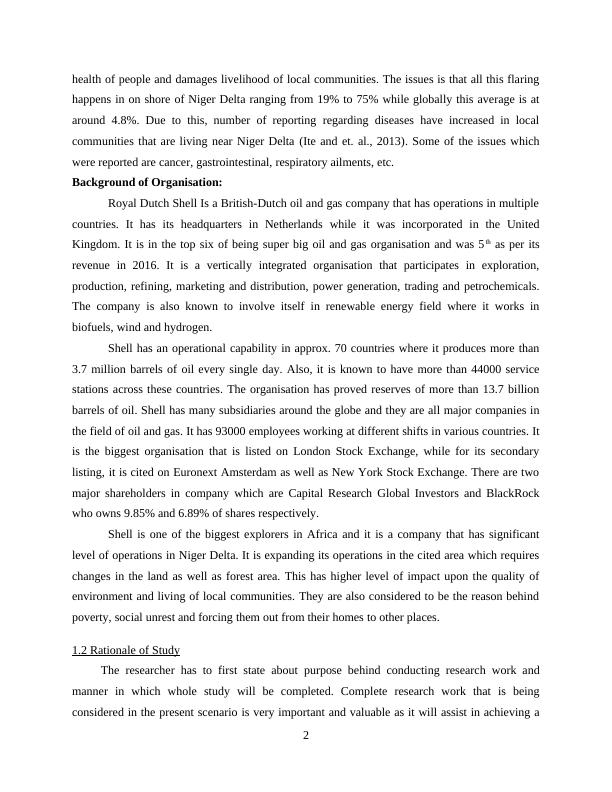
level of purpose. It is essential for investigator to identify rationale behind fact that why researchwork is being conducted. The current research work is conducted to determine impact ofoperation that are being conducted by Shell on environment and land of Niger Delta. There arevarious issues exist that enhances the chances of more unrest and problems to local communitiesas well as they lead to destruction of land. However, this expansion is very important as it willensure that organisation is able to dig and get more oil out of land. There is a relationship that exists in between people and the oil companies that are workingin Niger delta region. Any changes in the natural geography can lead to issues to people and theirlivelihood. This is the reason; it is important for companies to ensure that each aspect is properlyanalysed and factors are used in an appropriate manner. Every single company is spending ahuge sum of money on the operations of extracting oil and gas and this is the reason that it is notpossible for government to completely shut them off (What is an Oil spill at sea?,2017). Thisreport will assist the investigator as well as reader in understanding as how the activities that areconducted by these oil and gas organisations affect environment and land. This research workwill cover various aspects that will state about activities which are root cause behind increase inpollution and greenhouse gases. The research into consideration will focus on understanding howprograms and other events in Niger Delta will have an impact upon resources and overallenvironment. Along with that, it will assist in finding probable ways to sort this situation out. 1.3 Research aim and objectivesAim:“To analyse the Environmental Impact of Shell’s Oil and Gas Upstream Activities onLand: A case study of Niger-Delta”Objectives:To evaluate various reasons behind pollution caused by oil and gas productionTo identify stakeholders who are impacted by the activities of oil companies To analyse the impact of Shell’s oil and gas upstream activities on environment and land To determine the way expansion of oil extraction activities is troubling the localcommunities and traditional business of people1.4 Research questionsWhat are the ways by which oil and gas production is polluting environment? 3
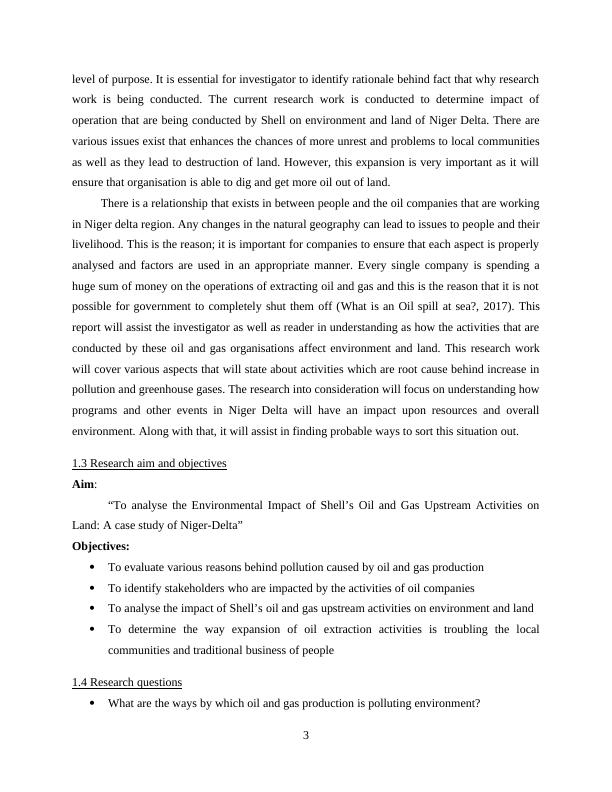
Who are the stakeholders that are impacted by activities of oil corporations?How the impact of Shell’s activities in oil and gas upstream can be analysed in context ofenvironment and land?What impact does expansion of oil companies in Niger Delta region give on localcommunities and their traditional form of business?1.5 Framework and analysisThe research work includes a brief framework on which each and every activity is takingplace. This will aid in attaining valid outcomes as well as ensure good results. The currentresearch work is based on analysis of environmental impact of oil and gas companies. Followingtools and techniques will be used as a structure to form an understandable report:Chapter 1: Introduction- It is made up of brief information regarding summary and states aboutobjectives as well as questions. It has covered complete data that is needed to understand theoperations of organisation. Rationale of study and its significance are stated here as well. Aim:An aim is set as a long term goal which answers the question as why this researchwork is being conducted. This will assist investigator in setting a path that can be followed toattain the end goals. Objective: Research work that is being conducted has to have some targets so that it canattain the prime goals. These will assist investigator in measuring the impact in future as well asanalyse the quality of report work. The case study of Shell’s operations in Niger Delta has beenused as a way to analyse the impact of oil and gas production on environment. This researchwork put a special focus on attaining all the objectivesQuestions: The researcher is stated to be responsible for defining a list of questions thathe will be using to guide himself and get the whole research work completed. In the present casescenario, researcher puts a special emphasis on identifying the solutions to questions.Chapter 2: Literature Review- This is a section which states about viewpoints of differentauthor on the issues which are being investigated in this research work. They will be collectedfrom secondary sources of data. Chapter 3: Research Methodology- This part covers all the information regarding variousapproaches that are required by the investigator to conduct research work. The study will bebased on Qualitative approach as to analyse various factors and their impact upon organisationeffectiveness. 4
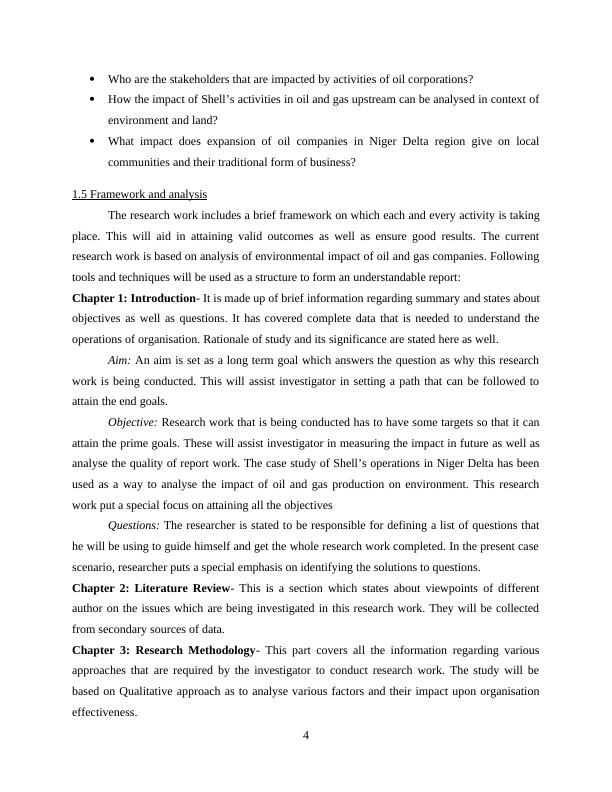
Chapter 4: Data analysis- All the information that has been collected by individual will beanalysed and presented in graphical and mathematical manner. Questionnaire will be used. Chapter 5: Conclusion and Recommendations- On the basis of findings, conclusion will bestated and certain recommendations will be made.5

End of preview
Want to access all the pages? Upload your documents or become a member.
Related Documents
Qualitative Interview on Oil and Gas Production in Niger Delta Regionlg...
|4
|1805
|462
Logistics and Supply Chain Management of Petroleumlg...
|48
|16570
|20
International Trade Assignment Dissertationlg...
|20
|4295
|34
Oil Spillage in Niger Delta Nigeria - PDFlg...
|44
|12318
|76
Report of Applied Business Research Problemlg...
|16
|4044
|48
SBLC7012 Research Methodology Principles of Knowledge Creationlg...
|24
|4991
|116